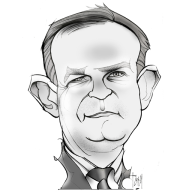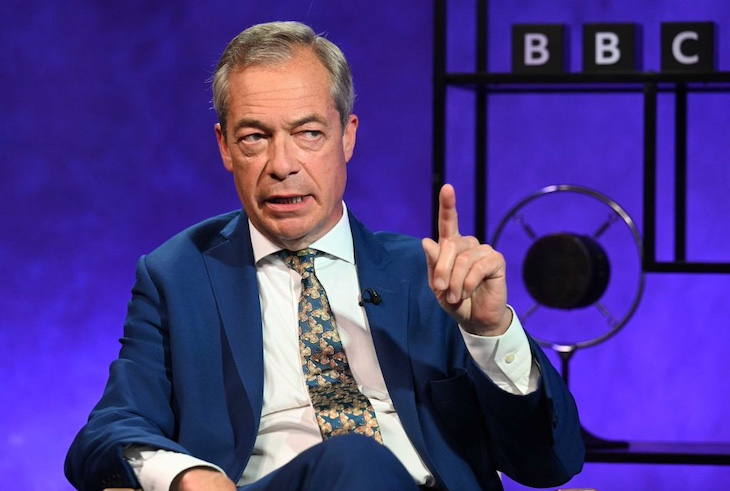‘We [the West] provoked this war [in Ukraine],’ Nigel Farage recently declared on BBC Panorama, blaming Putin’s invasion of the neighboring country on the ‘ever eastward expansion of Nato and the European Union’. He later doubled down on his claims, arguing that Putin’s behavior in Ukraine was ‘reprehensible, but…’
Farage of course is not alone in explaining Putin’s invasion of Ukraine by blaming Nato and the EU. For a start, Putin himself has done so repeatedly. Putin and Farage clearly see eye-to-eye on this point. But Farage’s views are also aligned closely with those of several academics, best represented by John Mearsheimer whose famous article – ‘Why the Ukraine Crisis Is the West’s Fault: The Liberal Delusions That Provoked Putin’ – was first published ten years ago, and has since become a point of reference for all those who seek to ‘explain’ Putin, not ‘justify’ him.
The problem with this reading is that it robs the offending party – Putin – of agency. As a result, explanation serves as an implicit justification. The argument suggests that other leaders, put in Putin’s shoes, would have conceivably been provoked in much the same way, and would have reacted in much the same way.
The reality could not be more different. To understand why, we need to distinguish between two types of threats. Some threats are objective. We know, for example, that the threat of global warming is not a figment of anyone’s inflamed imagination and that if we continue to burn fossil fuels at the rate that we do, then nasty things are bound to happen.
Other threats, however, are more elusive, and come down to perceptions and interpretations. Such threats are, to paraphrase the prominent political scientist Alexander Wendt, what we make of them.
In the case of Russia, the threat from the West is not only subjective, but also deeply disputed within Russia itself. Too often, we fall for the fallacy that there is only one viewpoint that the Russians supposedly hold and that any Russian would behave just like Putin did or worse.
This is not the case. I am a historian of Russian and Soviet foreign policy. I have just published a book that offers a panoramic sweep of the Kremlin’s approach to foreign relations from Stalin to Putin. If there is anything that writing this book has taught me, it is that 1) nothing is inevitable until it happens; and 2) there was often a real debate in Moscow about the nature of threats the Russians faced, and the range of available remedies.
My favorite historical anecdote to address this point takes us back to the end of the Cold War, at the very origins of the debate about Nato enlargement. In the winter-spring of 1990 Soviet leaders were contemplating the prospect of German unification. Some – broadly speaking, the military, and a few Communist party officials – were aghast at the idea, and dreaded the Soviet withdrawal from East Germany, citing security concerns.
Others, for example, Mikhail Gorbachev’s chief foreign policy aide Anatoly Chernyaev, thought these concerns were inflated. As Chernyaev put it in a memorandum to Gorbachev, ‘the situation is defined by the nuclear balance between the USSR and the USA.’ Did it even matter that the Soviet forces were pulled out of East Germany, or that Germany would be in Nato? Who would threaten the USSR? Who would dare to start a war with a nuclear power?
Gorbachev, as we know, went along with Chernyaev’s recommendations and… as we now know, the North Atlantic alliance did not invade Russia. Eastern Europe revived and prospered in the expanded EU, and in Nato. Russia itself benefited richly from this post-Cold War arrangement because, perhaps for the first time ever, it found itself surrounded by secure and happy countries. It could trade with these countries and, because of its energy leverage, it could even exercise a degree of ever-growing influence over them.
It is for this reason, perhaps, that Putin’s invasion of Ukraine struck the Russian expert community like a bolt of lightning out of clear skies. Far from being the only option for Russia, or a natural outcome of a process initiated by the West, the war seemed irrational, absurd, and self-defeating. It still is.
Instead of asking, amid misplaced self-flagellation, how our real or imaginary sins explain Putin’s inevitable crimes, we should respect Putin by granting him the agency that he deserves. He chose his threats. He chose from a range of policy options, not all of which had military outcomes. In other words, Putin chose war. Instead of explaining how Putin made these choices, Farage and his like should try to explain why he did not choose differently, and what would have happened if he did.
Here’s my view. If Putin hadn’t decided to begin this war, Ukraine would still know peace. It was certainly in no immediate danger of joining Nato, and in the completely unlikely scenario that it ever did join, Nato would have become more bloated and therefore more unwieldy. The threat of it invading Russia with or without Ukraine onboard would have been exactly zero.
Putin misread the nature of threats Russia faced. By buying into his narrative, Farage and his supporters misdiagnose the problem, and thus make it even more difficult to find a solution.








Comments